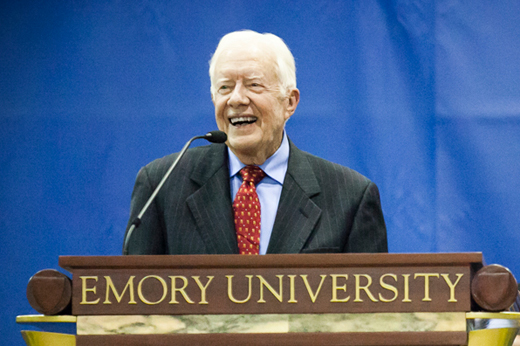If you missed former President Jimmy Carter's public talk last week at Emory on public health, religion and ethics, you can still download it on iTunes. Carter, University Distinguished Professor at Emory for the past 30 years, kept the audience of several hundred students, faculty and staff spellbound with a verbal portrait of his early days in Plains, Ga., "a time when we didn't have any miracle drugs."
He told of an aunt who died of strep throat, of the almost sure fatality of pneumonia, of the constant threat of diseases like typhus, whooping cough, tetanus/lockjaw, or the horrific vitamin deficiency disease pellagra. Because there was no cure for many of these illnesses, he said, "the entire thrust was on prevention."
All the more fitting then, that The Carter Center, in addition to its groundbreaking work in conflict resolution, found a primary vacuum that needed filling in neglected diseases of the developing world.
Carter said that the mission to eradicate disease among hundreds of millions of people is not easy. Sometimes, he said, "religion gets mixed up in medicine."
In Southern Sudan, for example, The Carter Center has had a role in helping reduce cases of guinea worm by 95 percent, said Carter. But first, workers had to convince religious leaders that a nearby pond they held to be sacred was responsible for spread of the disease.
"Don't let religion drive a wedge between you—find common ground," Carter said in response to a question about the best way to balance religious faith and ethical action.
Carter's talk was the first in a series sponsored by the Religion and Health Collaborative of Emory's Center for Ethics. The series is meant to raise questions about the principles guiding individuals and institutions and the on-the-ground reality of cooperation and contention between faith-based organizations and the public health sector.

